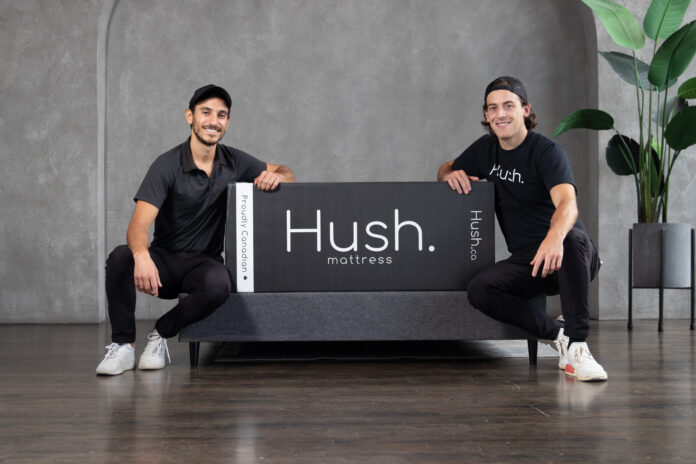You might not know of the concept of weighted blankets, but millions of people use them every night to fall asleep—myself included. Weighted blankets are said to help one fall asleep more quickly and to induce a deeper sleep than traditional blankets. Enter Lior Ohayon and his company Hush. A chance encounter with an advertisement for weighted blankets for children led Lior down an unlikely path to starting his own company (together with his partner Aaron Spivak), selling weighted blankets targeted at adults. Then, realizing that some people like the weight but not the heat of those blankets, they introduced an entire line of products dedicated to keeping people cozy but cool, including iced sheets. Today, those sheets outsell the blankets five to one.
Lior took an idea and put a twist on traditional marketing for his product, turning it into a business phenomenon that he recently sold for close to $50 million. Lior still runs Hush (more on that in the article) and recently expanded it to carry many other sleep-related products, such as mattresses, eye masks and more.
We touched upon many topics with practical implications, such as having dual websites, using charity as a marketing strategy and deciding what aspects of a business to outsource. Relax and enjoy! —Nesanel
I was born in Thornhill, Ontario. I’m one of four children. My father fixed helicopters for the US Army for a living. He was born in Morocco and learned the trade in the Israeli Army. When he was considering where to settle, his friends and family recommended Montreal as a good place to build a life. He met my mother, who is also from Morocco, on a Shabbaton there. It was actually my mother’s father who suggested he come to Toronto for this job.
“Funny story: My father was working for a Canadian company named SPAR Aerospace that was hired by the US Army to fix their helicopters. The contract expired and a different Canadian company won the bid by bidding really low. That company lacked the expertise to fix these helicopters, though, and they had to hire my father to train their team on how to do it! He is semi-retired now, but he’s a real Mr. Fix-It type—he’s always busy renovating people’s bathrooms or building something for our house. My mother is a branch manager of a Scotiabank branch here.
“I attended local schools here in Toronto, and then for beis midrash I went to Reishit in Israel for a year.
“I always liked selling things, but it was more about the thrill of selling than the profit. My older siblings used to tease me that I ‘buy high and sell low’—I’d sell a schoolmate a new game I got from my parents, even though he’d pay me less than my parents paid for it. So I guess I was always a bit entrepreneurial, even though I wasn’t good at it at the time.
“I actually thought I’d be a doctor when I grew up. I always enjoyed studying science and thought it would be a good career choice. But after one year in college, I realized that I don’t like looking at blood, and the prospect of doing surgeries didn’t interest me. I considered going for a business degree, but I didn’t feel they taught any practical skills—they offered classes on how Chase Bank changed their logo over the years and things like that. So I dropped out of school.
“I started working at a software company, Retirement Home Software, as customer support. It was a great job, but I was a kid. One day I walked into my boss’ office and told him I wanted to quit because I saw a course advertised online that would teach me how to build my own software. I thought I was going to become this big entrepreneur. He asked me why I couldn’t stay locally and take the course. I told him it was in Ohio. And I quit.
“I had thought the course required me to go to Ohio and attend in person. When I found out it was actually only an online course, I didn’t end up taking it. I also didn’t ask for my job back because my ego wouldn’t let me. But it lit a fire under me. I had $900 in my bank account, and I had to figure out how to make things work.
“I started researching ways to make money, and SEO (search engine optimization) to help companies be seen on online searches kept popping up. I joined online groups that shared tips and ideas about not only SEO itself but how to land SEO clients, and I became known as a bit of an expert.
“I was contacted by a large marketer who asked me to film a course for his website on how to attract new SEO customers. I told him I would only do it if we could split the revenue, and he agreed. That was my first truly entrepreneurial venture and the first time I made some real money.
“I felt I had a knack for this sales stuff and started a sales training blog called Scope Rush, with the tagline “Sell SEO with Lior O.” I built up a nice following and put together a pretty significant email database. People reached out to me to pitch their products to my database, and I would receive a percentage of each sale.
“Around 2015, I began thinking: Here I am making all this money as an affiliate promoting other people’s products. I should open a business and make a product that I can sell as well.
“I realized that the number one issue for people who do SEO for a living is finding clients to sell their SEO services to. I’d always had a passion for software, so I hired a freelance developer to build a software that was a lead generating tool. Say you wanted to target a certain audience, such as “dentists in Brooklyn.” This software would scour the internet for dentists in Brooklyn, find their email addresses and send them an email pitching the SEO services. I fine-tuned it to work for people offering many different services such as social media marketing. It would scour the target audience’s website and determine if it had a social media presence, and, if not, send them a personalized email as well.
“It was first sold as a standalone product selling 20,000 licenses, and then as a monthly subscription for $50 dollars a month. At our peak we had several thousand monthly subscribers.
“I eventually sold it to someone in the US. Sadly, he didn’t run it well, and it’s currently shelved. I still get emails asking for help from people trying to look for the service.
“About six years ago, I met Aaron Spivak through a mutual friend. He was younger than me, only 21, but I sensed that he had wisdom and business acumen. We became friendly and discussed business. Once he watched as I held a webinar offering a coaching program to SEO experts and managed to make $40,000 in sales in an hour; he was floored.
To read more, subscribe to Ami





















